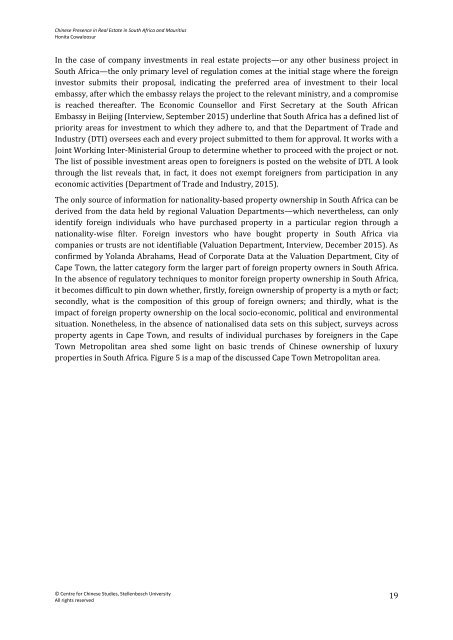and Mauritius
CCS_Research-Report_Chinese_Presence_South-Africa_Mauritius_Honita_Cowaloosur_2016
CCS_Research-Report_Chinese_Presence_South-Africa_Mauritius_Honita_Cowaloosur_2016
You also want an ePaper? Increase the reach of your titles
YUMPU automatically turns print PDFs into web optimized ePapers that Google loves.
Chinese Presence in Real Estate in South Africa <strong>and</strong> <strong>Mauritius</strong><br />
Honita Cowaloosur<br />
In the case of company investments in real estate projects—or any other business project in<br />
South Africa—the only primary level of regulation comes at the initial stage where the foreign<br />
investor submits their proposal, indicating the preferred area of investment to their local<br />
embassy, after which the embassy relays the project to the relevant ministry, <strong>and</strong> a compromise<br />
is reached thereafter. The Economic Counsellor <strong>and</strong> First Secretary at the South African<br />
Embassy in Beijing (Interview, September 2015) underline that South Africa has a defined list of<br />
priority areas for investment to which they adhere to, <strong>and</strong> that the Department of Trade <strong>and</strong><br />
Industry (DTI) oversees each <strong>and</strong> every project submitted to them for approval. It works with a<br />
Joint Working Inter-Ministerial Group to determine whether to proceed with the project or not.<br />
The list of possible investment areas open to foreigners is posted on the website of DTI. A look<br />
through the list reveals that, in fact, it does not exempt foreigners from participation in any<br />
economic activities (Department of Trade <strong>and</strong> Industry, 2015).<br />
The only source of information for nationality-based property ownership in South Africa can be<br />
derived from the data held by regional Valuation Departments—which nevertheless, can only<br />
identify foreign individuals who have purchased property in a particular region through a<br />
nationality-wise filter. Foreign investors who have bought property in South Africa via<br />
companies or trusts are not identifiable (Valuation Department, Interview, December 2015). As<br />
confirmed by Yol<strong>and</strong>a Abrahams, Head of Corporate Data at the Valuation Department, City of<br />
Cape Town, the latter category form the larger part of foreign property owners in South Africa.<br />
In the absence of regulatory techniques to monitor foreign property ownership in South Africa,<br />
it becomes difficult to pin down whether, firstly, foreign ownership of property is a myth or fact;<br />
secondly, what is the composition of this group of foreign owners; <strong>and</strong> thirdly, what is the<br />
impact of foreign property ownership on the local socio-economic, political <strong>and</strong> environmental<br />
situation. Nonetheless, in the absence of nationalised data sets on this subject, surveys across<br />
property agents in Cape Town, <strong>and</strong> results of individual purchases by foreigners in the Cape<br />
Town Metropolitan area shed some light on basic trends of Chinese ownership of luxury<br />
properties in South Africa. Figure 5 is a map of the discussed Cape Town Metropolitan area.<br />
© Centre for Chinese Studies, Stellenbosch University<br />
All rights reserved<br />
19


